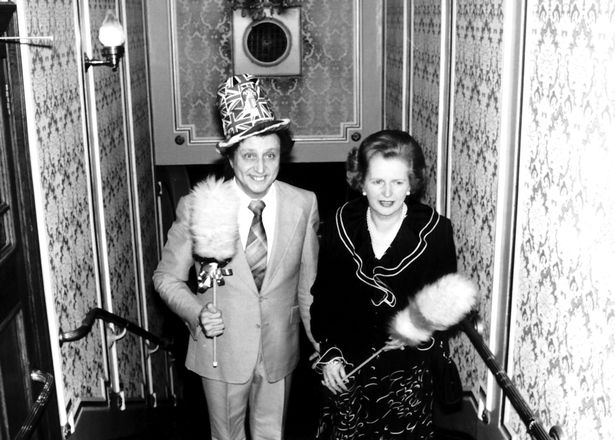Ken Dodd

I first met Ken Dodd – whose death has been announced – when he came around a corner in a shopping street in Liverpool, brandishing his tickling stick, and in the company of Margaret Thatcher. It was the 1979 Edge Hill by election and he was trying to drum up votes for my Conservative opponent.

I never held it against him and over the years enjoyed bumping into him in less political circumstances. I was delighted to learn that he and the lovely Ann – his companion for several decades – had finally tied the knot just days before his death.
Back in 2010 Ken Dodd gave a lecture that I organised on the relationship between citizenship and humour.
It was on his birthday and we had arranged a celebration dinner for him at Liverpool John Moores University afterwards.
So I told him we really did have to finish on time. He got back at my impertinence by wheeling on a huge egg timer onto the stage at Liverpool’s Philharmonic Hall. As he donned a mortar board and gown, concealed in the wheelbarrow, he didn’t utter a word but the audience immediately saw the joke at my expense.
The first questioner of the night asked Ken if he would like to have been Prime Minister – quick as a flash, alluding to complicated tax returns, he replied “No, but Chancellor of the Exchequer….”
During his wonderful lecture he demonstrated the depth of his knowledge and an understanding of how laughing can be a balm to someone who is hurting: “You are what you laugh at; you laugh at what you are afraid of” he said.
Good humour can reveal a good attitude and celebrating the joy of simply being alive can be a positive way of strengthening society.
It was Gracie Fields, the Lancashire comedienne, who once said “it’s so bad luv, laughing is all that’s left.” Laughter is one of the greatest therapies in combating adversity; and whole communities and nations have frequently relied on humour to get them through their bleakest times.
Jokes about those who rule you – and sometimes those who tyrannise you – and comic songs, during war time, have always offered relief from the sombre realities, such as the aerial bombardment of cities like Coventry, London and Liverpool; humour inspired solidarity in the face of a common enemy.
Laughter and satire and in the face of acute suffering humour really is balm. Prisoners of war, returning from Vietnam and Japanese internment told how mirth, wise-cracking, ridiculing humour and mocking had sustained them. It was a way of fighting back.
Even in holocaust literature there are references to humour as a way of coping. Victor Frankl recalls that “humour was another of the soul’s weapons in the fight for self-preservation.”
In more totalitarian societies laughter relieves, at least temporarily, the pressures and anxiety of political oppression. Political jokes may not in themselves topple dictators, but they can provide solace. As Ken might have said, in a democracy like our own, perhaps the trouble with political jokes is that they sometimes get elected.
May he rest in peace:
http://www.itv.com/news/granada/2018-03-12/comedy-legend-sir-ken-dodd-dies-aged-90/



